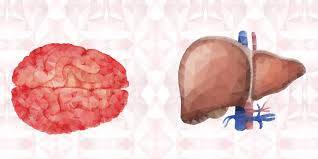Hepatic encephalopathy is a condition that affects the brain due to severe liver disease. Here are 20 potential factors related to hepatic encephalopathy, along with signs and symptoms, effects, and solutions:
**Causes:**
1. Liver cirrhosis.
2. Acute liver failure.
3. Chronic liver disease.
4. Portal hypertension.
5. Gastrointestinal bleeding.
6. High ammonia levels in the blood.
7. Hepatitis.
8. Alcoholic liver disease.
9. Hepatic tumors.
10. Liver surgery.
11. Use of medications affecting the central nervous system.
12. Electrolyte imbalances.
13. Dehydration.
14. Infections (e.g., spontaneous bacterial peritonitis).
15. Kidney dysfunction.
16. Gastrointestinal bleeding.
17. High-protein diet.
18. Constipation.
19. Malnutrition.
20. Environmental toxins (e.g., lead poisoning).
**Signs and Symptoms:**
1. Changes in mental state (confusion, disorientation).
2. Personality changes.
3. Mood swings.
4. Agitation.
5. Poor concentration.
6. Slurred speech.
7. Asterixis (flapping tremor of the hands).
8. Muscle stiffness and rigidity.
9. Uncontrollable movements.
10. Drowsiness or fatigue.
11. Altered sleep patterns (day-night reversal).
12. Difficulty with fine motor skills.
13. Fetor hepaticus (musty or sweet odor of the breath).
14. Jaundice (yellowing of the skin and eyes).
15. Hyperventilation or irregular breathing patterns.
16. Ammonia smell on the breath.
17. Hepatomegaly (enlarged liver).
18. Ascites (abdominal fluid buildup).
19. Spontaneous bacterial peritonitis (infection of abdominal fluid).
20. Coma (in severe cases).
**Effects:**
1. Impaired brain function.
2. Cognitive changes and confusion.
3. Personality changes and mood swings.
4. Disorientation.
5. Altered motor skills.
6. Risk of accidents and injuries.
7. Slurred speech.
8. Flapping tremor of the hands (asterixis).
9. Drowsiness and fatigue.
10. Day-night reversal of sleep patterns.
11. Impact on daily life and relationships.
12. Poor concentration and judgment.
13. Risk of coma (in severe cases).
14. Risk of aspiration pneumonia.
15. Impact on overall quality of life.
16. Risk of complications during surgery.
17. Worsening of liver disease.
18. Liver and kidney dysfunction.
19. Increased healthcare costs.
20. Risk of infections and sepsis.
**Solutions:**
1. Treatment of underlying liver disease (e.g., cirrhosis).
2. Medications to reduce ammonia levels (e.g., lactulose).
3. Rifaximin to treat or prevent bacterial infections.
4. Low-protein diet.
5. Management of electrolyte imbalances.
6. Management of gastrointestinal bleeding.
7. Treating or managing infections (e.g., spontaneous bacterial peritonitis).
8. Diuretics for ascites.
9. Monitoring and treatment of kidney dysfunction.
10. Psychotherapy and counseling.
11. Support from healthcare professionals.
12. Support from family and friends.
13. Support groups for individuals with hepatic encephalopathy.
14. Regular medical monitoring.
15. Nutritional support.
16. Palliative care (in severe cases).
17. Educational programs for healthcare professionals.
18. Public health initiatives to promote awareness.
19. Legal regulations and policies to reduce toxin exposure.
20. Avoiding alcohol and certain medications.
Hepatic encephalopathy is a serious condition that requires medical management. If you suspect you have hepatic encephalopathy or are at risk, consult a healthcare professional for evaluation and guidance.



No comments yet
Be the first to share your thoughts!